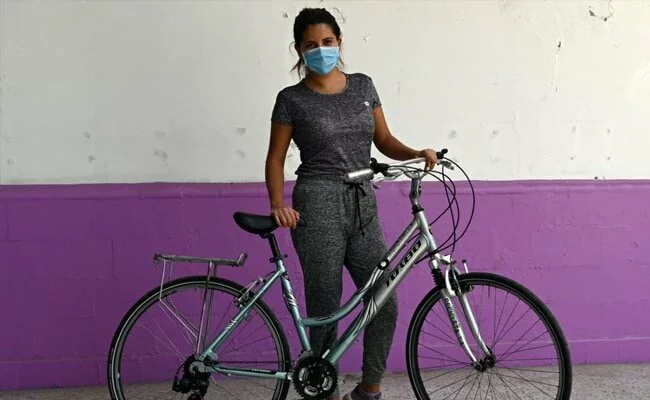Daniela Chavez, a doctor, went to work on a bicycle after feeling discriminated against by a taxi driver.
His bike was a gift from activists who collected bikes – dubbed by an organization as “recycling” – to donate to healthcare workers in Mexico City, to protect them from stigma to care for COVID-19 patients.
Chavez said that as soon as she got into the cabin after a hard day at a public hospital, the driver asked her if she was a doctor and where she worked.
Fearing that she would suffer an aggressive reaction if she told him, as some colleagues have done, the 26-year-old woman decided to go out instead.
“I don’t know if this is psychosis! We know that we are people at risk, we always have been, but now that people discriminate against us for doing a worthy job, it’s unprecedented”, she explained to AFP.
As the coronavirus spread in Mexico, health care workers faced physical assault in addition to the suspicion of those who saw it as a source of infection.
But in April, two organizations of cyclists came to their aid, launching a social media initiative asking people to donate unused bikes or spare parts to give to healthcare workers.
Simultaneously, Bicitekas and Alcaldia de la Bicicleta invited health workers to apply online to receive a bicycle.
“Depressing”
In their workshop in the central district of La Escandon, between pedals, wheels and saddles, a group of activists spend 20 hours a week repairing and assembling bikes.
The initiative also aims to reduce the risk of infection of doctors and nurses when using public transport in the city of more than 15 million inhabitants.
“At the start of this epidemic, we wondered what we could do to support discriminated healthcare workers on their journey and, unfortunately, attacked because of their profession,” said Agicite Martinez, founder of Bicitekas .
The organization has received 240 requests for “recycling”, as its bikes are called. So far, they have delivered around fifty.
For Diana Garduno, a 30-year-old nurse, it was a welcome boon because her bike was stolen from a burglary.
She says she has been afraid since one of her colleagues was sprayed with a hot drink while walking down the street.
“It is depressing to see how we give everything to keep a patient well and once outside, we experience this type of abuse,” said Garduno.
Loic Jaeger, director of Doctors Without Borders (MSF) for Mexico and Central America, told AFP that the attacks were taking place against a backdrop of “normalization of violence” that spills over from organized crime.
“If we had more knowledge, there would be no such action against health workers,” added Diego Villafuerte, 23, a trainee in a private clinic who received a bicycle.
“A healthy distance”
On Monday, Mexico began to reopen “essential” sectors of its industry, including mining, aviation, construction and the manufacture of transportation equipment, after more than two months of closure.
The country of 127 million inhabitants has recorded more than 10,600 deaths and nearly 100,000 cases of coronavirus.
As part of the relaxation of virus restrictions, Mexico City also authorized the sale of bicycles, the mode of transport celebrated internationally on Wednesday during an annual event inaugurated by the United Nations in 2018.
The mobility secretariat should build 54 kilometers (34 miles) of bike paths to help give the five million people who used the metro every day before the lockdown another option.
Hopefully this will reduce the spread of COVID-19, while adding to the 88 kilometers that already exist in Mexico.
The long-term goal is to reach 600 kilometers by 2024.
With the bike “you can keep a healthy distance, it’s not contagious,” explained the head of the secretariat, Andres Lajous.
(This story has not been edited by GalacticGaming staff and is automatically generated from a syndicated feed.)









